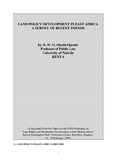| dc.contributor.author | Okoth-Ogendo, HWO | |
| dc.date.accessioned | 2013-06-18T13:40:11Z | |
| dc.date.available | 2013-06-18T13:40:11Z | |
| dc.date.issued | 1999 | |
| dc.identifier.citation | (A Regional Overview Paper for the DFID Workshop on ‘Land Rights and Sustainable Development in Sub-Saharan Africa’ held at Sunningdale Park Conference Centre, Berkshire, England, 16 - 19 February, 1999) | en |
| dc.identifier.uri | http://scholar.google.com/scholar?start=10&q=okoth+ogendo&hl=en&as_sdt=0,5 | |
| dc.identifier.uri | http://hdl.handle.net/11295/35719 | |
| dc.description.abstract | Land policy in East Africa has had an extremely colourful history. Although firmly rooted in a
common foundation cast by the Berlin Conferences of 1884-85 that sanctioned the partition of
Africa among the European powers, actual development of land policy on the ground in the three
countries of Tanzania (formerly Tanganyika) Uganda, and Kenya (briefly East Africa), parted
ways soon thereafter and for nearly a century remained radically different in each jurisdiction.
The primary reason for this was that although the assumption of imperial jurisdiction over these
territories came almost simultaneously at the close of the 19th century, the ‘constitutional’ effect
thereof varied both with the actual political formations in existence in each context, and the
immediate needs and concerns of the imperial authority. | en |
| dc.language.iso | en | en |
| dc.title | Land policy development in East Africa: A survey of recent trends | en |
| dc.type | Book | en |
| local.publisher | Public Law, Faculty of Law, University of Nairobi | en |

